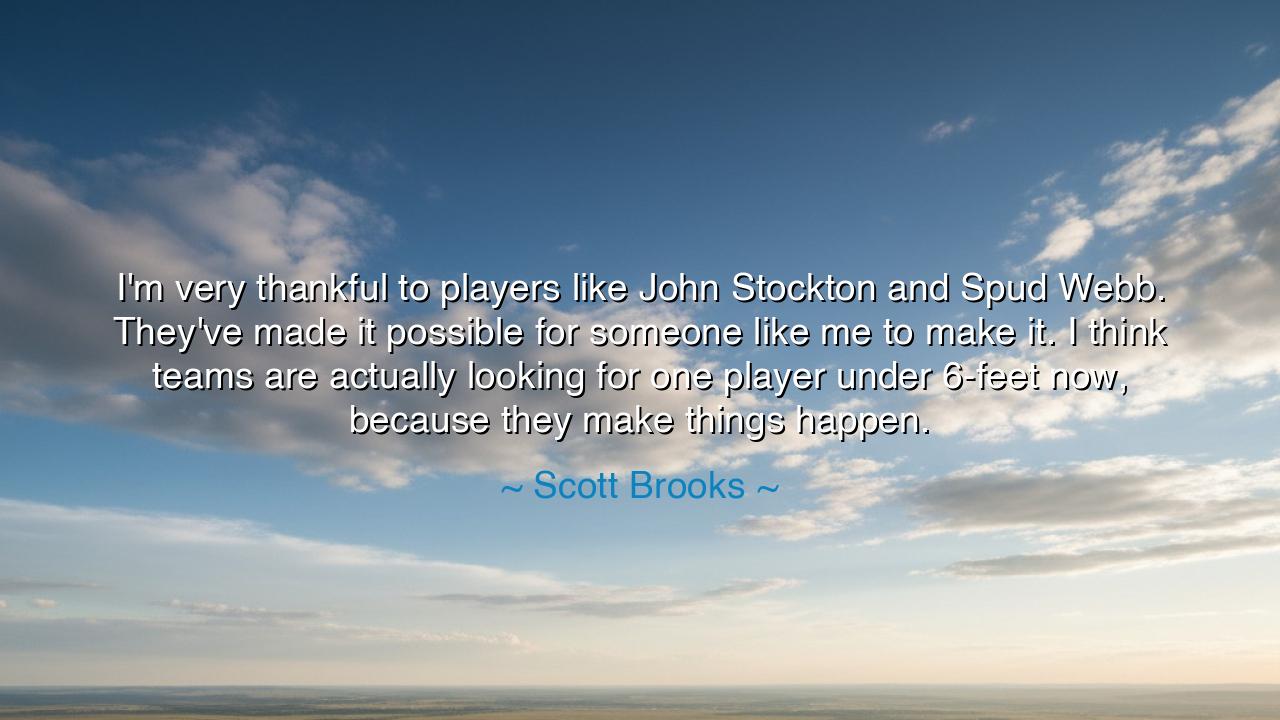
I'm very thankful to players like John Stockton and Spud Webb.
I'm very thankful to players like John Stockton and Spud Webb. They've made it possible for someone like me to make it. I think teams are actually looking for one player under 6-feet now, because they make things happen.






When Scott Brooks declares, “I’m very thankful to players like John Stockton and Spud Webb. They’ve made it possible for someone like me to make it. I think teams are actually looking for one player under 6-feet now, because they make things happen,” he is offering more than a tribute to fellow athletes. He is acknowledging the eternal chain of pioneers who make the path straighter for those who come after them. His words carry the humility of one who knows that his success was not born in isolation, but in the courageous example of others who dared to defy the expectations of size, stature, and stereotype.
The origin of his gratitude lies in the unforgiving world of professional basketball, a sport that prizes height as its crown jewel. In such an arena, men under six feet are often dismissed before they even touch the court. Yet players like John Stockton, with his uncanny vision and unrelenting discipline, and Spud Webb, who shocked the world by winning the Slam Dunk Contest at 5’7”, shattered the illusion that greatness was the sole province of giants. Their achievements carved a space for men like Brooks to be seen not as exceptions, but as assets—proof that skill, grit, and intelligence can conquer the tyranny of physical measure.
This pattern of trailblazing is as old as humanity itself. Consider the tale of Hannibal Barca, who led his armies across the Alps, a feat thought impossible by the generals of his day. His daring shattered the notion that mountains could stop a determined commander. After him, the impossible was no longer impossible. In the same way, Stockton and Webb demolished the myth that only towering men could command the basketball court. They did not only win games—they changed perceptions, and in changing perceptions, they changed opportunities for all who followed.
Brooks’ thankfulness reflects an awareness of the unseen victories fought before his own. He recognizes that every shot he took, every game he played, was made easier because others had already borne the burden of doubt and skepticism. It is humility, not arrogance, that fills his words. He does not pretend to be a solitary conqueror; he is a traveler on a path carved by others. This humility teaches us that no achievement is wholly our own—it is the fruit of seeds planted by those who came before.
There is also great encouragement in his observation that “teams are actually looking for one player under 6-feet now.” What once was a liability has become a sought-after strength. This is the great reversal that happens when pioneers prove the doubters wrong. What was once mocked becomes valuable; what was once weakness becomes a niche of power. Brooks reminds us that when barriers fall, they do not fall for one—they fall for all.
The lesson here is timeless: never despise the power of an example. A single person, by daring to stand against the tide, can alter the expectations of an entire generation. And never forget to be thankful for those pioneers, for they carried battles that we no longer must fight. Gratitude preserves humility, and humility keeps us strong, lest we forget the shoulders upon which we stand.
Practical wisdom follows. Look to your own life and ask: who paved the way for me? Who bore the doubts, the ridicule, the hardships, so that I might stand more freely? Honor them, as Brooks honors Stockton and Webb. And in turn, strive to be such a pioneer for others. Live in such a way that your perseverance tears down barriers, so that those who follow may walk more easily. Let your life be an example that opens doors, and your gratitude a testimony that no one rises alone.
Thus, in the words of Scott Brooks, we are reminded of an ancient truth: that greatness is not only in the victories we claim, but in the gratitude we show to those who cleared the road before us. To be thankful for their courage is to live with humility; to follow their example is to keep the flame of progress burning. Let us, then, honor the pioneers in our own lives, and strive to become pioneers for others. In this way, the chain of courage will never be broken.






AAdministratorAdministrator
Welcome, honored guests. Please leave a comment, we will respond soon